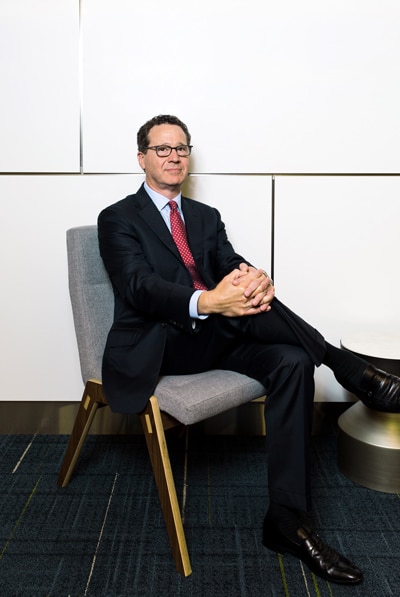Consumers might not realize it, but Fannie Mae CFO David Benson could make a big difference in their lives. He and his colleagues are helping the mortgage financier make the home loan process faster, safer, and more reliable for lenders and homeowners.

These are not the aims of a typical CFO, but Benson brings an extraordinarily diverse background to the job.
He gained a great deal of experience in his fourteen years at Merrill Lynch. There, he worked in various parts of the fixed-income business. He dealt with a number of products in different parts of the world, one of which led him to work out of the company’s London office for several years. By the end of his tenure, he was skilled at running both US and global businesses.
“I was fortunate to get a broad background in fixed-income markets and gain a deep expertise in what was driving the macroeconomies of the world,” says Benson.
Joining Fannie Mae
The chance to join Fannie Mae in 2002, he says, was simply too good to pass up. It was and still is one of the largest participants in the global capital and interest rate derivative markets. When he took the job, the company was the largest issuer of debt in the private marketplace. He knew his work at Fannie Mae could help grow the US economy.
“There’s something exciting about being a part of something that has a direct impact on housing outcomes for so many families and a direct impact on the broader economy,” he says.
Benson says he also knew he could leverage everything he’d learned on Wall Street at Fannie Mae, although he was still able to learn and gain experience in his new position. “The interesting thing was that with of all the markets I had been involved with on the Street, I had never been responsible for mortgage debt,” he says. “This job completed the cycle of giving me experience in managing every kind of fixed-income product.”
Broadening Horizons
It didn’t take long for Benson to further broaden his own horizon. He moved from treasurer to the head of capital markets, where he oversaw one of the largest funded balance sheets ($800 billion) in the world at the time. Then, in 2013, Fannie Mae CEO Timothy J. Mayopoulos appointed him CFO.
“I was not a CPA and had never been responsible for any finance or accounting function,” Benson says.
“But it was appealing to be able to marry what I knew about business and the markets to lead other parts of the company I didn’t have direct expertise in and hopefully make the finance function more relevant.”
As head of capital markets, Benson long involved himself in Fannie Mae’s corporate strategy. Moving to the CFO role expanded that leverage.
Benson wasn’t worried about coming into the CFO role without an accounting background. Instead, he focused on making the people around him as effective as possible in their roles.
“That ends up being the key to all this,” he says. “It’s not about being the expert. I think CFOs today need to be able to understand the business and the accounting. But they also need to define strategy and be an innovator.”
Providing Value to the Marketplace
That last piece has become increasingly important for Benson and Fannie Mae as the company moves forward with its strategy to provide more value to the marketplace in general and improve the housing finance system in the United States.
“We aspire to be America’s most valued housing partner,” he says. “We need to challenge our own thinking and accelerate the pace of change that is really necessary if you want to reach a different level of operating in an industry that’s so complex.”
“Because of how central Fannie Mae is in the market, if we don’t have an innovation agenda, we could hold the market back,” Benson says. Because of this, he has actively pushed innovation from within and paid close attention to fintech start-ups that have rushed to apply innovations such as artificial intelligence to make the housing finance system work faster and smoother.
“We’re looking forward to being at a point where tech companies that wish to engage in the mortgage industry will come to Fannie Mae first and work with us in various ways to leverage the partnerships that can help the industry,” he says.
The bottom line is taking advantage of any new technology to accomplish two goals. One goal is reducing the amount of risk in the system. The other is increasing the amount of digital content the mortgage process uses.
“Today, it could take a couple of months to close a loan,” says Benson. “Our objective is to reduce those cycle times to a number of days.”
The Innovation Push
The company has already seen results from its innovation push. Through its Day 1 Certainty initiative, Fannie Mae leveraged its industry-standard Desktop Underwriter system with data validation services that use third-party vendors to validate an applicant’s information digitally before a loan is ever delivered to Fannie Mae. This helps eliminate some of the inefficiencies that plague the current process.
Another new tool, Collateral Underwriter, helps reduce risk for both Fannie Mae and lenders. It helps lenders evaluate the appraisals they receive on loans to make sure that values are appropriate and that information on the property is accurate.
With these kinds of innovations, Benson wouldn’t be surprised if the mortgage process was half as long in five years.
“It might be a lot less than that,” he says. “We’re really doing everything we can to drive time lines down. It’s going to be interesting to see what kind of impact this has.”
That’s the whole reason Benson got into this business. The impact he is having on the housing market is direct and real, even if consumers don’t realize it.
SimCorp provides integrated, best-in-class investment management solutions to the world’s leading asset managers, fund managers, asset servicers, pension and insurance funds, wealth managers, and sovereign wealth funds. Whether deployed on-premise or as an ASP solution, its core system, SimCorp Dimension, supports the entire investment value chain and range of instruments, all based on a market-leading IBOR. SimCorp invests more than 20 percent of its annual revenue in R&D, helping clients develop their business and stay ahead of ever-changing industry demands. Listed on NASDAQ Copenhagen, SimCorp is a global company, regionally covering all of Europe, North America, and Asia Pacific.
Focusing on Innovation
These continue to be unprecedented times for financial services companies. From emerging technologies to increasingly complex global compliance issues to shifting demographics, the call for innovative vision has never been stronger.
At KPMG, we work with the world’s largest financial services organizations every day. This experience gives us both global and national perspective, as well as deep insights into the latest trends and most pressing issues across every sector of the industry.
What’s more, it leads to an approach that begins with vision and drives innovation, so we can help organizations adapt to today’s uncertainties and anticipate tomorrow’s opportunities.

